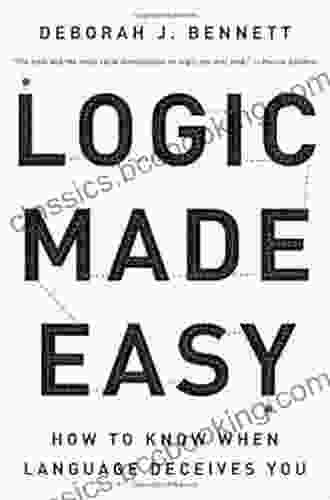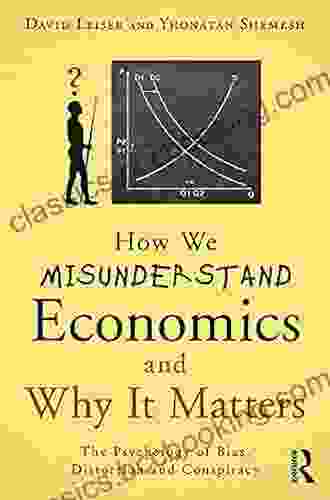The Psychology of Bias, Distortion, and Conspiracy: Unraveling the Mind's Hidden Traps

Our minds are complex and intricate, capable of remarkable feats of perception, judgment, and understanding. However, our cognitive processes are also prone to biases, distortions, and irrationalities that can lead us to misinterpret reality and make poor decisions. The Psychology of Bias, Distortion, and Conspiracy delves into these hidden traps of the mind, exploring the cognitive mechanisms that shape our beliefs and perceptions.
The Prevalence of Cognitive Biases
Cognitive biases are systematic errors in our cognitive processes that lead us to make predictable and irrational judgments. These biases are pervasive and influence various aspects of our lives, from decision-making to social interactions. Some common cognitive biases include:
4.2 out of 5
| Language | : | English |
| File size | : | 3676 KB |
| Text-to-Speech | : | Enabled |
| Screen Reader | : | Supported |
| Enhanced typesetting | : | Enabled |
| Word Wise | : | Enabled |
| Print length | : | 178 pages |
- Confirmation bias: The tendency to seek out information that confirms our existing beliefs while ignoring evidence that contradicts them.
- Availability heuristic: The tendency to overestimate the likelihood of events that come to mind easily.
- Hindsight bias: The tendency to believe that we could have predicted an event after it has already occurred.
- Illusion of control: The tendency to believe that we have more control over events than we actually do.
- Negativity bias: The tendency to pay more attention to negative information than positive information.
The Role of Cognitive Distortions
Cognitive distortions are irrational thought patterns that lead us to misinterpret reality. These distortions are often rooted in our fears, anxieties, and past experiences. Some common cognitive distortions include:
- Overgeneralization: Making assumptions about a person or situation based on limited information.
- All-or-nothing thinking: Seeing things in black-and-white terms, without considering shades of gray.
- Emotional reasoning: Believing that something is true simply because it feels true.
- Mind reading: Assuming that we know what others are thinking without evidence.
- Personalization: Taking things personally when they are not intended for us.
The Allure of Conspiracy Theories
Conspiracy theories are unfounded beliefs that posit that events are caused by secret plots or machinations. While conspiracy theories can be enticing and provide a sense of Free Download in an uncertain world, they often lack evidence and rely on speculation and rumor. The psychology of conspiracy theories revolves around:
- Uncertainty: Conspiracy theories can offer certainty and control in the face of ambiguity.
- Pattern recognition: Our brains seek patterns and connections, which can be easily exploited by conspiracy theorists.
- Illusion of knowledge: Conspiracy theories can make us feel knowledgeable and superior.
- Social bonding: Sharing conspiracy theories can strengthen group bonds and provide a sense of belonging.
- Confirmation bias: Conspiracy theorists seek out information that confirms their beliefs.
Overcoming These Mental Traps
Recognizing and overcoming cognitive biases, distortions, and the allure of conspiracy theories is crucial for critical thinking and rational decision-making. Here are some strategies to help us avoid these mental traps:
- Challenge assumptions: Question our beliefs and consider alternative perspectives.
- Seek out diverse information: Expose ourselves to a wide range of viewpoints and sources.
- Evaluate evidence: Carefully consider the validity and reliability of information before accepting it.
- Consider alternative explanations: Look for plausible alternative explanations to conspiracy theories.
- Practice self-awareness: Recognize our own biases and triggers.
The Psychology of Bias, Distortion, and Conspiracy provides a comprehensive exploration of the hidden traps of the mind. By understanding these cognitive mechanisms, we can become more aware of how they influence our beliefs and behaviors. Through critical thinking, self-awareness, and a commitment to seeking truth, we can overcome these mental barriers and make more informed and rational decisions.
4.2 out of 5
| Language | : | English |
| File size | : | 3676 KB |
| Text-to-Speech | : | Enabled |
| Screen Reader | : | Supported |
| Enhanced typesetting | : | Enabled |
| Word Wise | : | Enabled |
| Print length | : | 178 pages |
Do you want to contribute by writing guest posts on this blog?
Please contact us and send us a resume of previous articles that you have written.
 Book
Book Novel
Novel Page
Page Chapter
Chapter Text
Text Story
Story Genre
Genre Reader
Reader Library
Library Paperback
Paperback E-book
E-book Magazine
Magazine Newspaper
Newspaper Paragraph
Paragraph Sentence
Sentence Bookmark
Bookmark Shelf
Shelf Glossary
Glossary Bibliography
Bibliography Foreword
Foreword Preface
Preface Synopsis
Synopsis Annotation
Annotation Footnote
Footnote Manuscript
Manuscript Scroll
Scroll Codex
Codex Tome
Tome Bestseller
Bestseller Classics
Classics Library card
Library card Narrative
Narrative Biography
Biography Autobiography
Autobiography Memoir
Memoir Reference
Reference Encyclopedia
Encyclopedia Danielle Koehler
Danielle Koehler Debbie Madson
Debbie Madson Dayle Campbell Gaetz
Dayle Campbell Gaetz Danielle L Schultz
Danielle L Schultz David Brooks
David Brooks Dawnie Walton
Dawnie Walton Deanna Roy
Deanna Roy David G Marwell
David G Marwell David Lusted
David Lusted Daniella Weiss Ashkenazy
Daniella Weiss Ashkenazy Dean Karnazes
Dean Karnazes David E Mccraw
David E Mccraw David J Schmidt
David J Schmidt Dashka Slater
Dashka Slater Daron Acemoglu
Daron Acemoglu Dawn G Marsh
Dawn G Marsh David E Stuart
David E Stuart David Sammel
David Sammel Darren G Davis
Darren G Davis Deborah D Douglas
Deborah D Douglas
Light bulbAdvertise smarter! Our strategic ad space ensures maximum exposure. Reserve your spot today!
 Dave SimmonsFollow ·9.2k
Dave SimmonsFollow ·9.2k Esteban CoxFollow ·17.1k
Esteban CoxFollow ·17.1k Phil FosterFollow ·5k
Phil FosterFollow ·5k Mario SimmonsFollow ·17.6k
Mario SimmonsFollow ·17.6k Brenton CoxFollow ·6.3k
Brenton CoxFollow ·6.3k Ken SimmonsFollow ·2.9k
Ken SimmonsFollow ·2.9k Banana YoshimotoFollow ·16.2k
Banana YoshimotoFollow ·16.2k Todd TurnerFollow ·8.8k
Todd TurnerFollow ·8.8k

 Cameron Reed
Cameron ReedHow to Know When Language Deceives You
Unmasking the Power of...

 Robbie Carter
Robbie Carter50 Things To Know About Planning Home Schooling...
: The Power of Hands-On Learning Embarking...

 Julio Cortázar
Julio CortázarCalculus: Single and Multivariable, 8th Edition — The...
Calculus is the...

 Jaime Mitchell
Jaime MitchellBunnicula and Friends: A Spooktacular Tale of Mystery and...
In the quaint little town of Celeryville,...

 Josh Carter
Josh CarterPeppa Easter Egg Hunt: Join Peppa Pig on an...
Get ready for...

 Donovan Carter
Donovan CarterBoy Called Dickens: A Journey into the Childhood of a...
Delving into the...
4.2 out of 5
| Language | : | English |
| File size | : | 3676 KB |
| Text-to-Speech | : | Enabled |
| Screen Reader | : | Supported |
| Enhanced typesetting | : | Enabled |
| Word Wise | : | Enabled |
| Print length | : | 178 pages |












